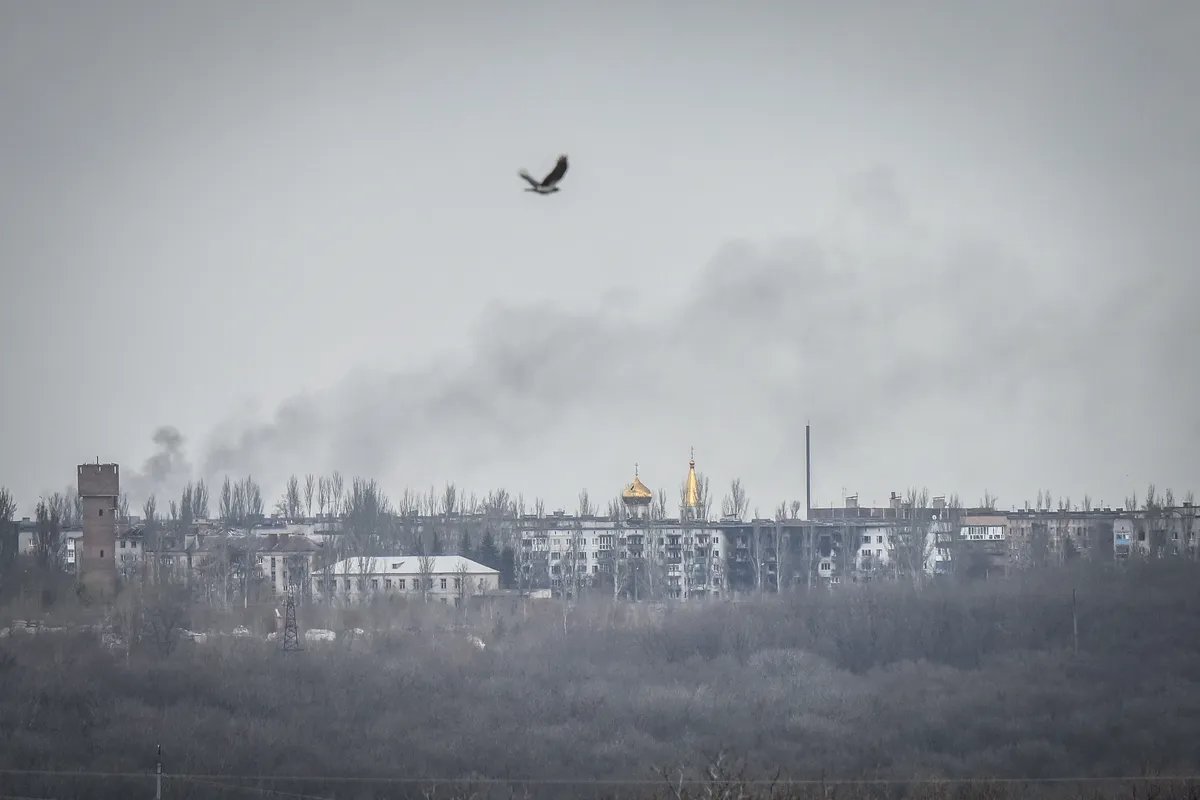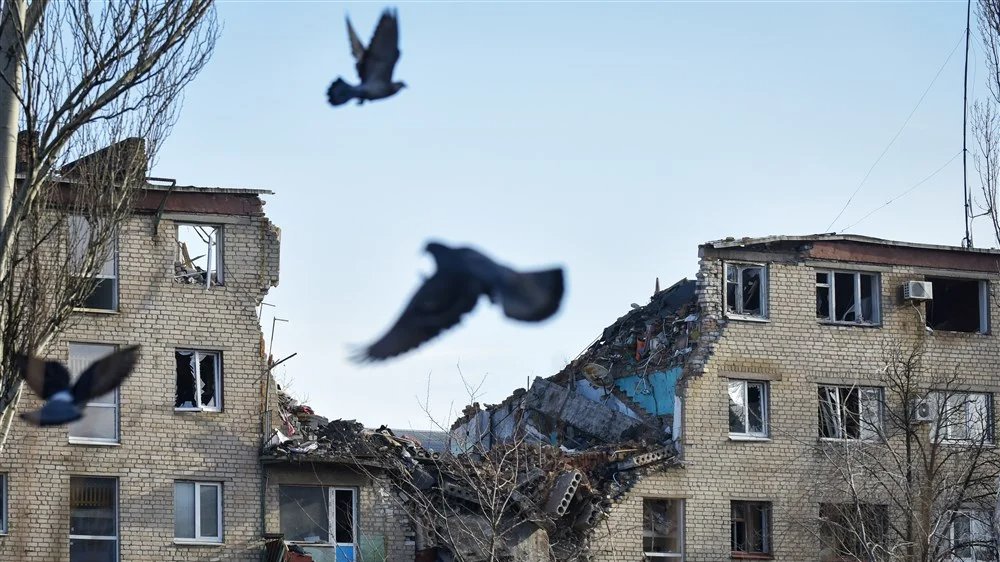It has been debated for several days whether PMC Wagner did, in fact, manage to capture the Ukrainian city of Bakhmut in its entirety. Both sides are self-assuredly claiming successes of their forces. And although Russian propagandists are comparing the smaller Bakhmut to Stalingrad and even Berlin, the city’s actual strategic significance is not very great, it seems. The winner will end up with blood-soaked ruins and destroyed infrastructure.
Dispute between presidents
On 20 May, head of PMC Wagner Yevgeny Prigozhin posted a video on social media in which he claimed that his mercenaries had captured all of Bakhmut. Prigozhin, of course, did not forget to mention the “betrayal” of military-adjacent bureaucrats, naming, among others, Russia’s Defence Minister Sergey Shoigu and Chief of the General Staff Valery Gerasimov, who previously “prevented” the Wagner fighters from capturing the Ukrainian city. According to the head of PMC Wagner, the operation to capture Bakhmut lasted 224 days; he plans to withdraw his fighters for rest and retraining by 25 May. The video also showed Wagner’s mercenaries install flags of their PMC and Russian banners on the roofs of several buildings greatly damaged by shelling.
Russian pro-war Telegram channels promptly went into celebration mode. Many authors of Telegram channels compared Bakhmut to Stalingrad and presented Prigozhin’s announcement as one of the most important events of the war. Meanwhile, Russia’s state-controlled Channel One even claimed that the Wagner fighters in Bakhmut should be experiencing the same feelings as “their grandfathers in Berlin”.
Several hours later, Russia’s Defence Ministry also reported that Bakhmut, which is often referred to as Artemovsk in Russia today, had been taken. The next day, Vladimir Putin congratulated Russian servicemen and Wagner’s assault troops on their success and promised to award the most distinguished participants of the operation. This was the first time the Russian president has ever mentioned PMC Wagner in an official statement.
At the same time, Volodymyr Zelensky, who was in Japan for the G7 Summit, also commented on the situation. His first statement was found to be ambiguous by many. When asked by a journalist: “Is Bakhmut still in Ukraine’s hands? The Russians say they’ve taken Bakhmut,” he responded:
“I think no… But you have to understand that there is nothing… They destroyed it, there are no buildings. <...> For today, Bakhmut is only in our hearts.”
Later, Zelensky definitively said that, according to his information, the Ukrainian Armed Forces’ units had not abandoned their positions and continued to defend the city: “Our servicemen are carrying out very important objectives now, they are in Bakhmut, I cannot be more specific, but the city is not captured by the Russian Federation. There could be no other interpretations.”
Joe Biden also included himself in the narrative, announcing the overall outcomes of the fight for the city: “Bakhmut is a discussion, about whether or not it has been lost or whatever. And, well, the truth of the matter is the Russians have suffered over 100,000 casualties in Bakhmut. That’s hard to make up. So, whether or not there are troops in Bakhmut occupying, there’s not many buildings left standing in Bakhmut,” the US president said.
Encircling the attackers
The Ukrainian military refutes the complete capture of Bakhmut. Spokesman of Ukraine’s Eastern Group of Forces Serhiy Cherevaty was quoted saying that the Ukrainian army was conducting an operation to encircle the city. Deputy Minister of Defence of Ukraine Hanna Maliar called the situation “critical”, clarifying that Ukraine’s servicemen were holding the line in the last standing part of the city — “in the Samolet district”.
The US Institute for the Study of War (ISW) report dated 21 May states that Wagner’s mercenaries likely captured the western administrative borders of the city, while Ukrainian forces continue to prioritise counterattacks on the outskirts of Bakhmut. “Ukrainian military officials reported that Ukrainian forces control an ‘insignificant’ part of southwestern Bakhmut City around the T0504 highway — a tacit acknowledgement that Russian forces have secured the rest of western and northwestern Bakhmut, if not all of it,” the statement reads. “The Wagner Group’s likely capture of the last remaining small area of western Bakhmut does not impact ongoing Ukrainian counterattacks north or south of Bakhmut. <...> Russian forces will likely need additional reinforcements to hold Bakhmut City and its flanks at the expense of operations in other directions.”
ISW also writes, citing Ukrainian military sources, that Russian forces “lost part of the dominant heights around Bakhmut”, noting that “sustained Ukrainian advances could lead to a tactical encirclement of Wagner forces in Bakhmut”. According to ISW, “Russian conventional forces such as the 72nd Separate Motorized Rifle Brigade are unsuccessfully attempting to regain lost positions and respond to Ukrainian counterattacks on Bakhmut’s flanks”.
In the past, ISW forecasted that Wagner’s offensive operations would likely reach culmination after several months of exhausting urban combat and that PMC Wagner would continue fighting “beyond Bakhmut at its current depleted state”.
“Despite the fact that Wagner’s mercenaries and Russian servicemen have achieved some success in moving through the city, when it comes to holding the flanks, they more often than not face failures,” head of the Military Legal Studies Centre Oleksandr Musiyenko tells Novaya-Europe.
“Today, Ukraine’s Armed Forces are achieving success in the south and north of Bakhmut, they have already almost half encircled the city, which could soon become a complete encirclement.”
“Having captured the heights, Ukraine can now target Russian forces, using artillery and mortar fire. Today, almost the entire city is being shelled.”

Bakhmut. Photo: ЕРА
According to Musiyenko, the Russian government considered Bakhmut to be a bridgehead for further advancement as well as a place where Russia could exhaust Ukraine’s reserves and destroy the units that were being prepared for the Ukrainian counteroffensive. But in practice, Russian troops are currently blocked in Bakhmut, while Ukrainian forces are encircling them in the outskirts, Musiyenko speculates. Furthermore, on Ukraine’s side the operation does not involve fresh units, instead relying on troops that previously fought in this area and were sent back after reorganisation.
The hurry with which Prigozhin is trying to withdraw his people from Bakhmut could remind some of the capture of Syria’s Palmyra. The city, captured by Wagner’s mercenaries after an assault that had spilt a lot of blood, was handed over to the Russian army, which soon surrendered Palmyra to militants of the Islamic State, banned both in Russia and other countries. Afterwards, the mercenaries had to storm the city again, suffering significant losses. But the thing is: when it comes to Bakhmut, another assault on the city could end up being too difficult of a task for the battered PMC.
Join us in rebuilding Novaya Gazeta Europe
The Russian government has banned independent media. We were forced to leave our country in order to keep doing our job, telling our readers about what is going on Russia, Ukraine and Europe.
We will continue fighting against warfare and dictatorship. We believe that freedom of speech is the most efficient antidote against tyranny. Support us financially to help us fight for peace and freedom.
By clicking the Support button, you agree to the processing of your personal data.
To cancel a regular donation, please write to [email protected]

